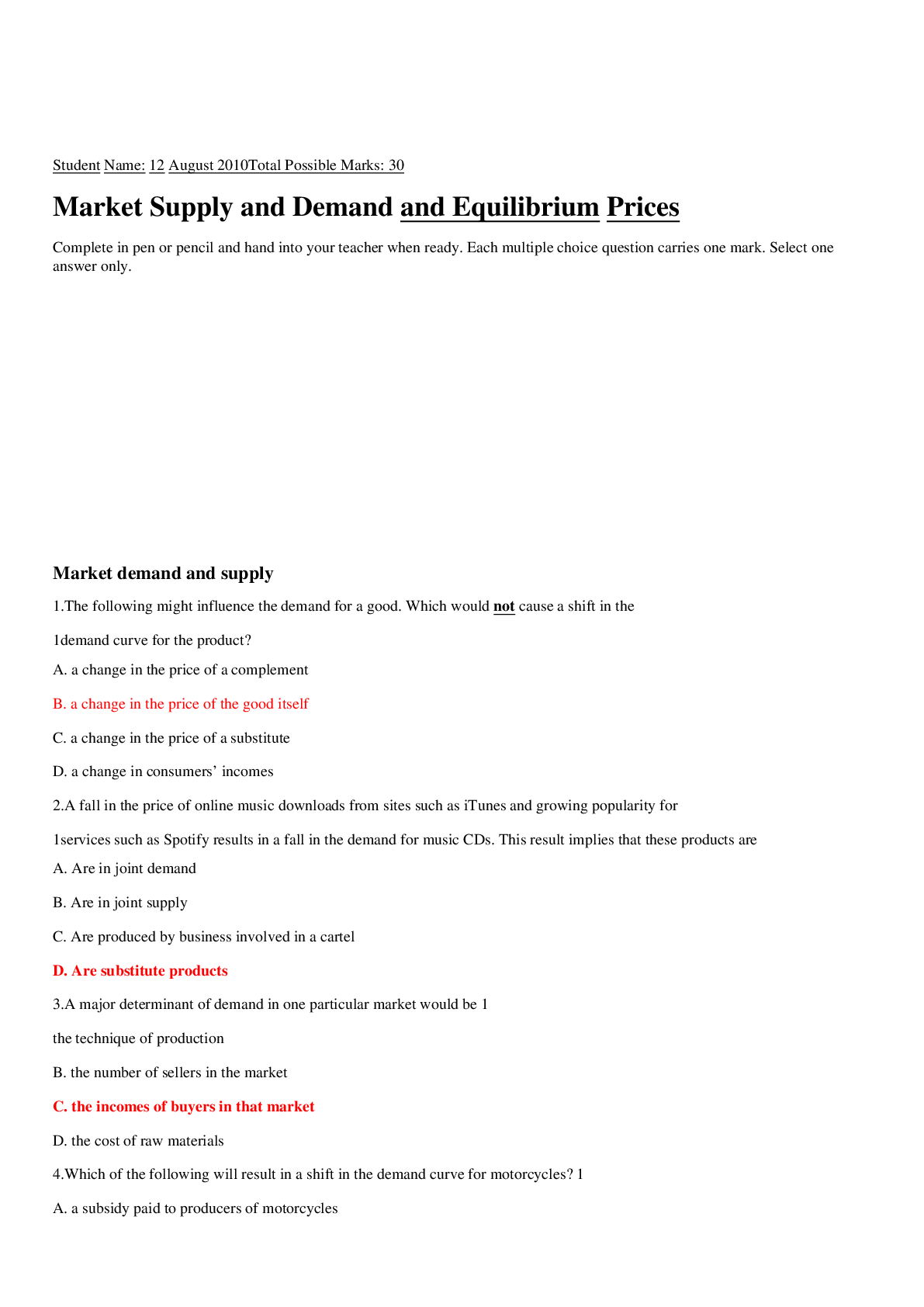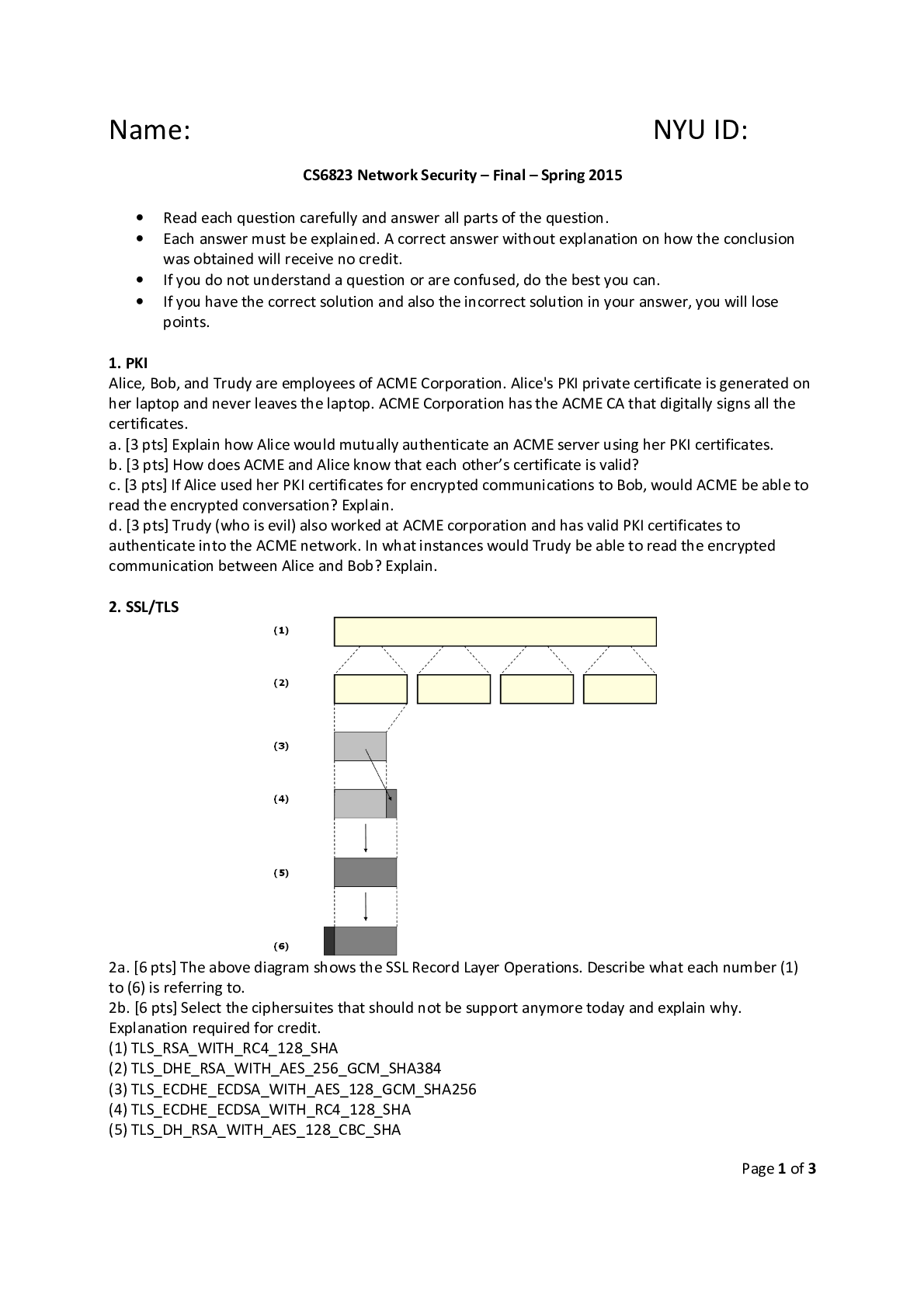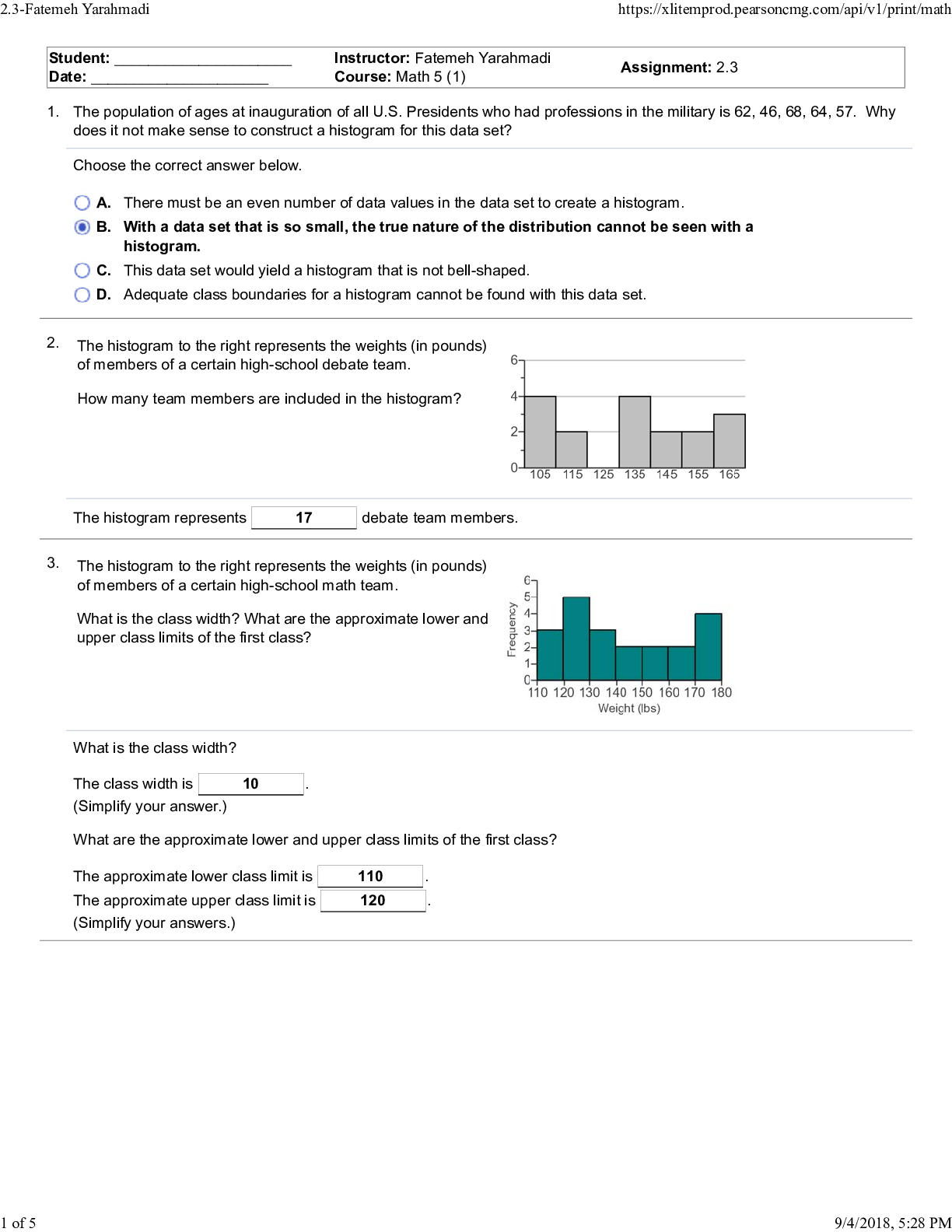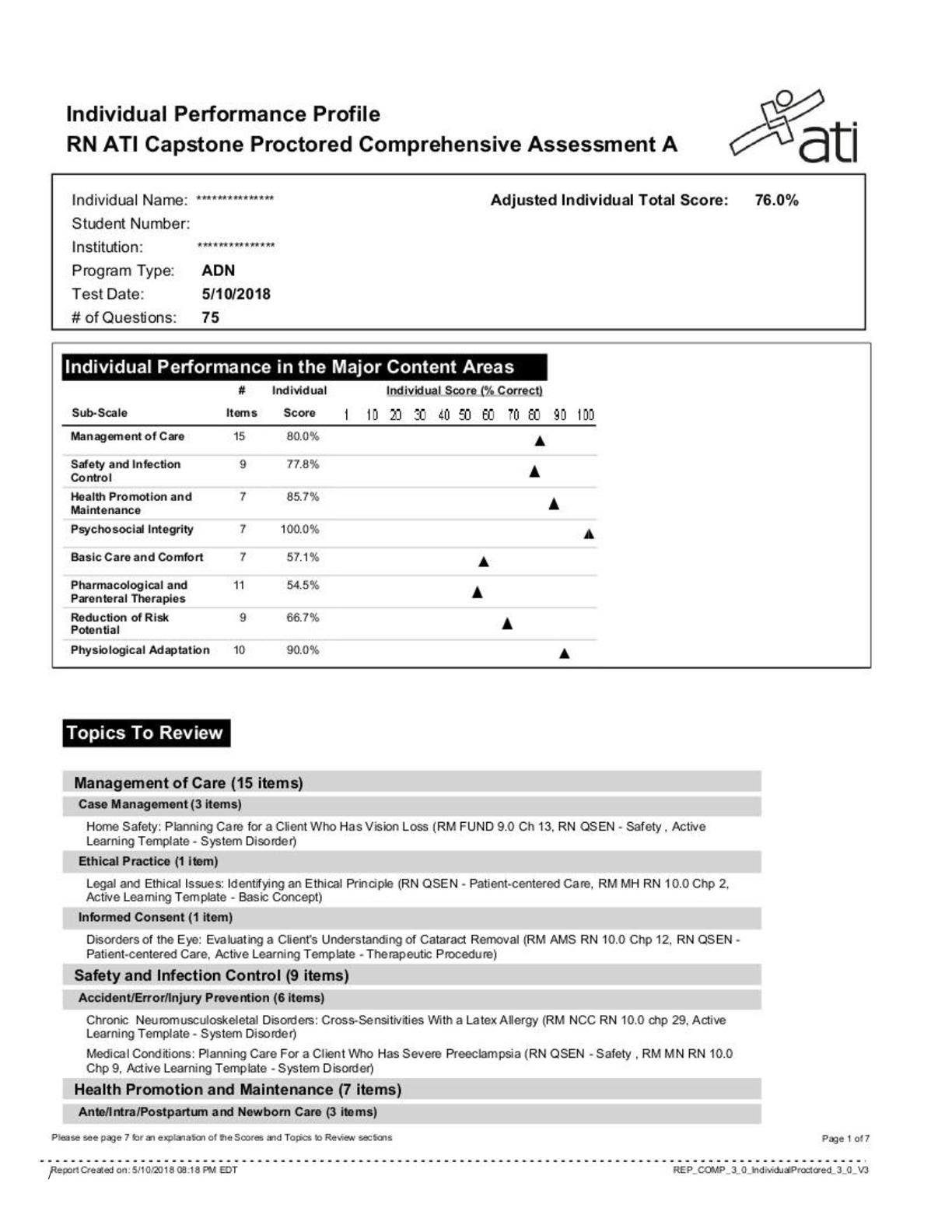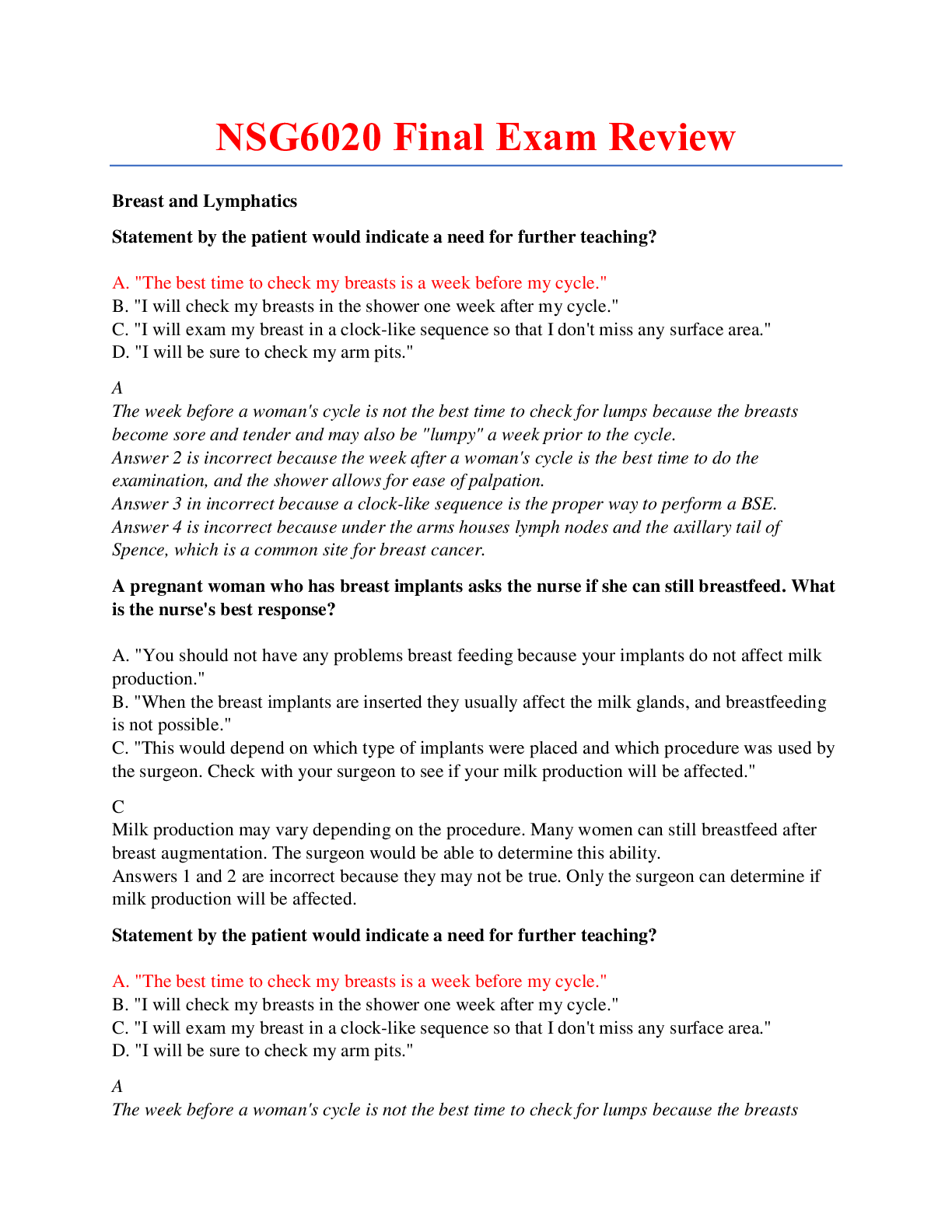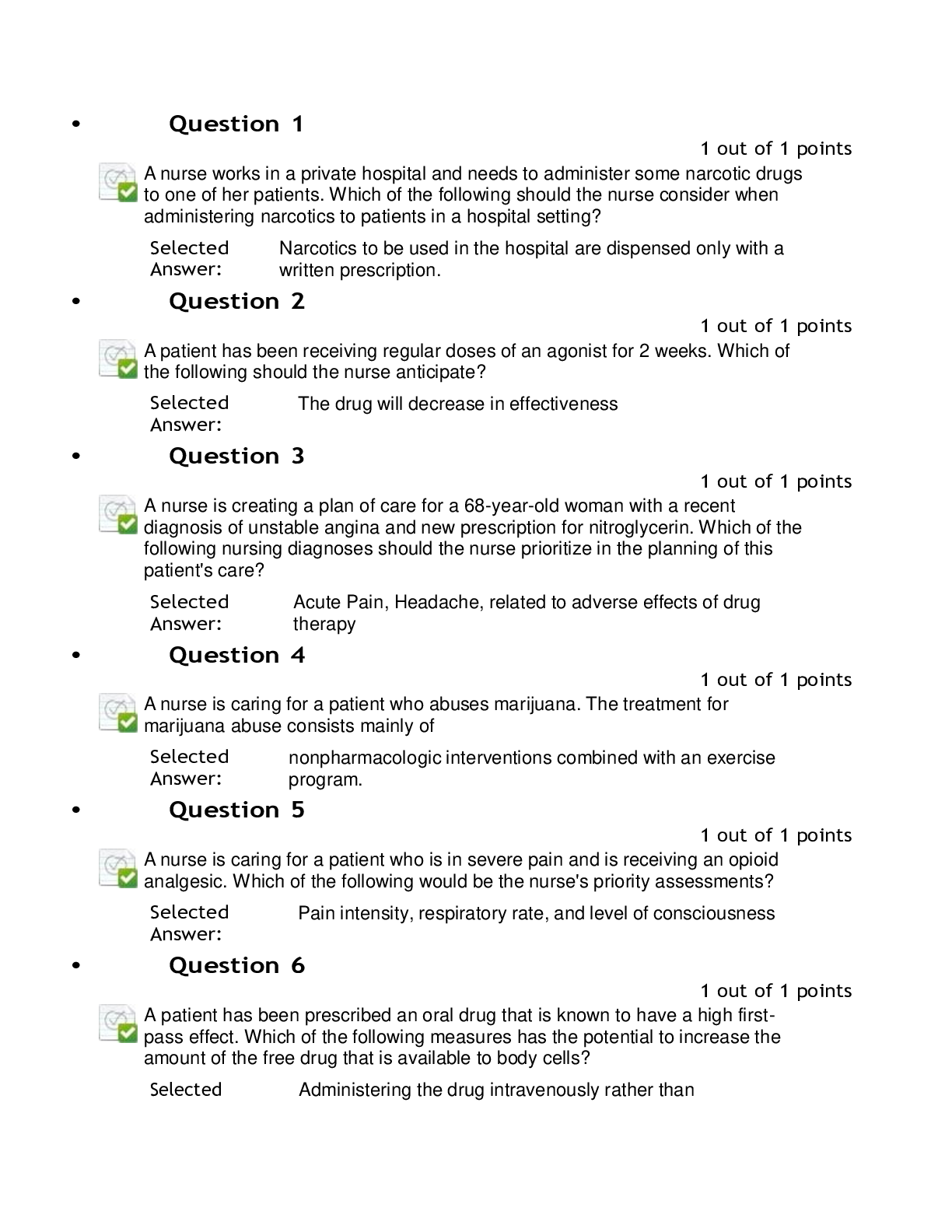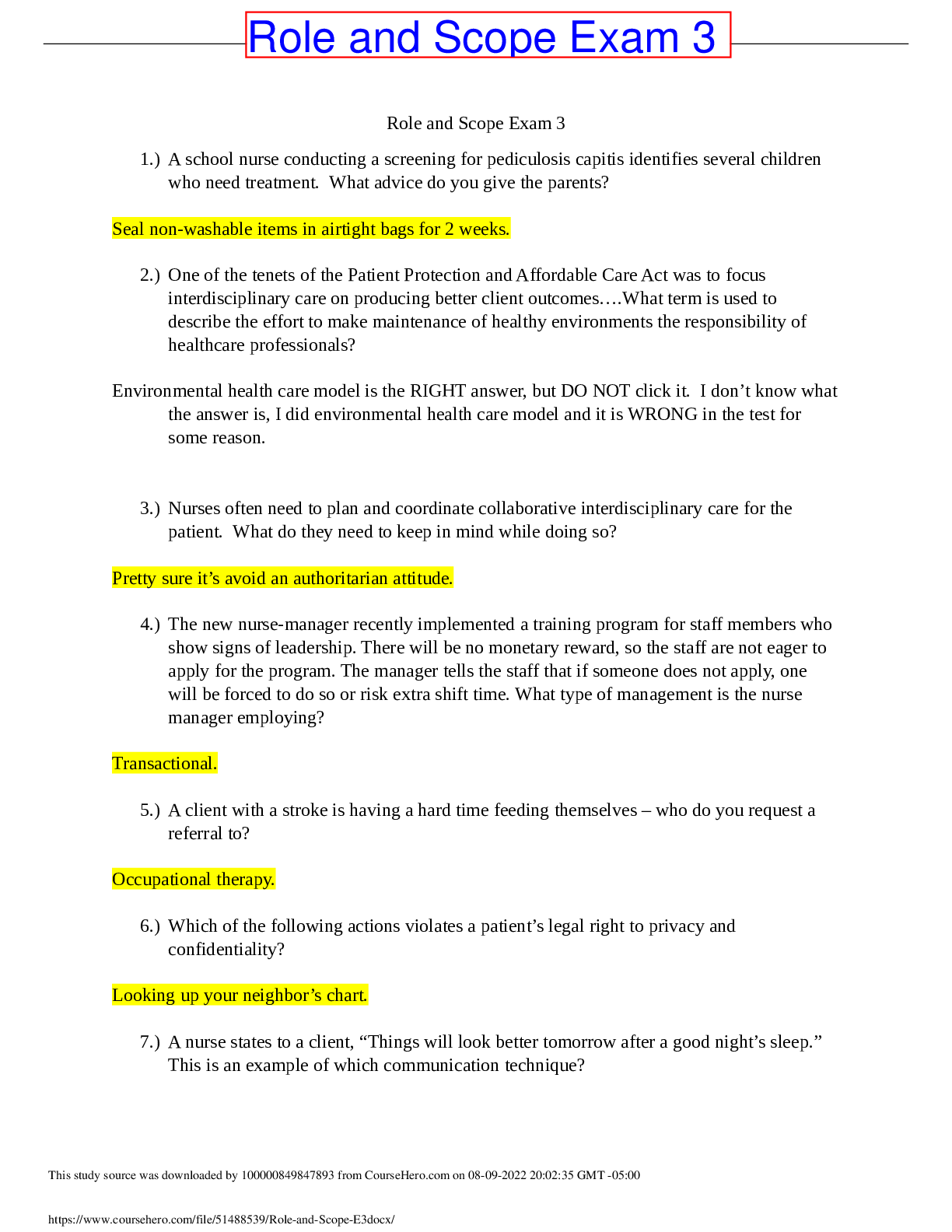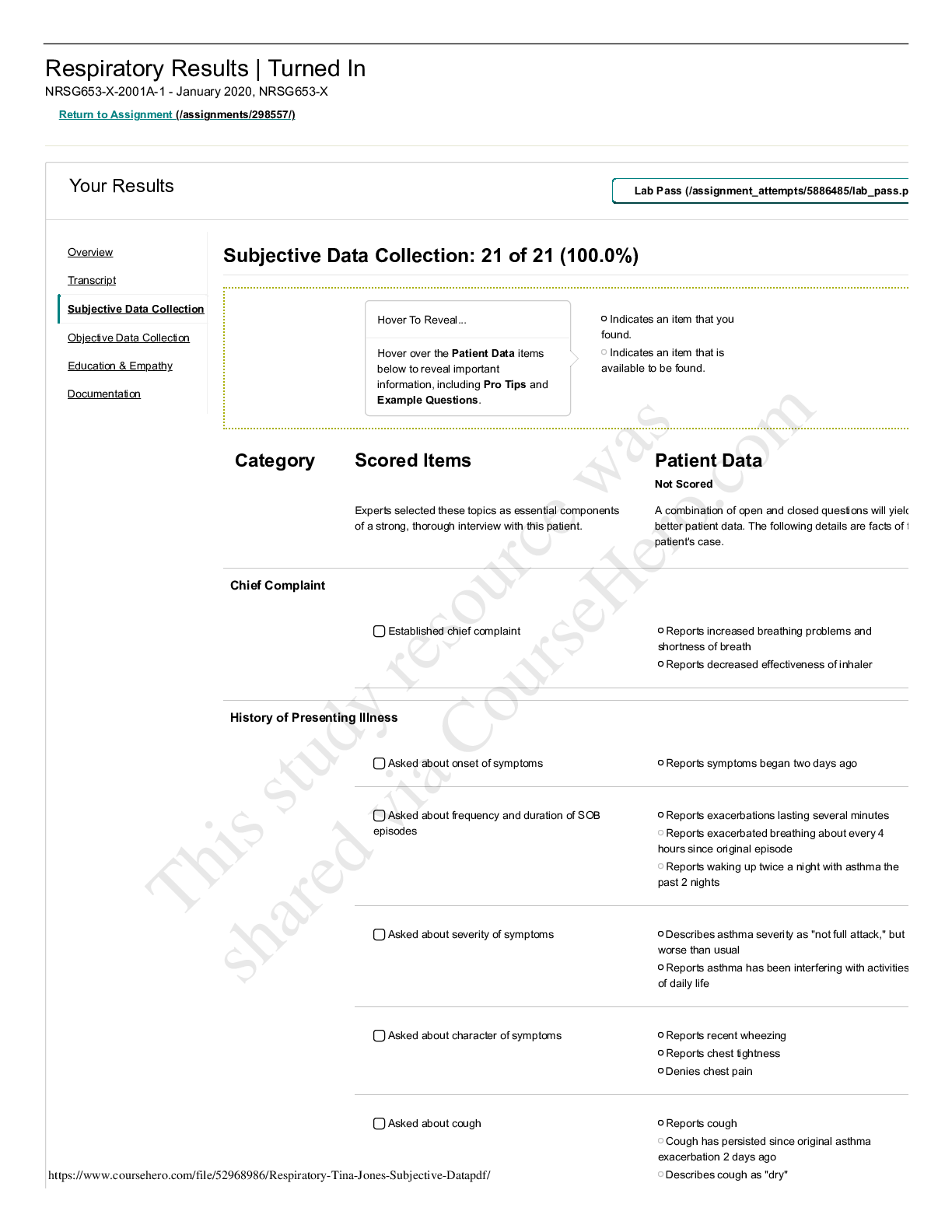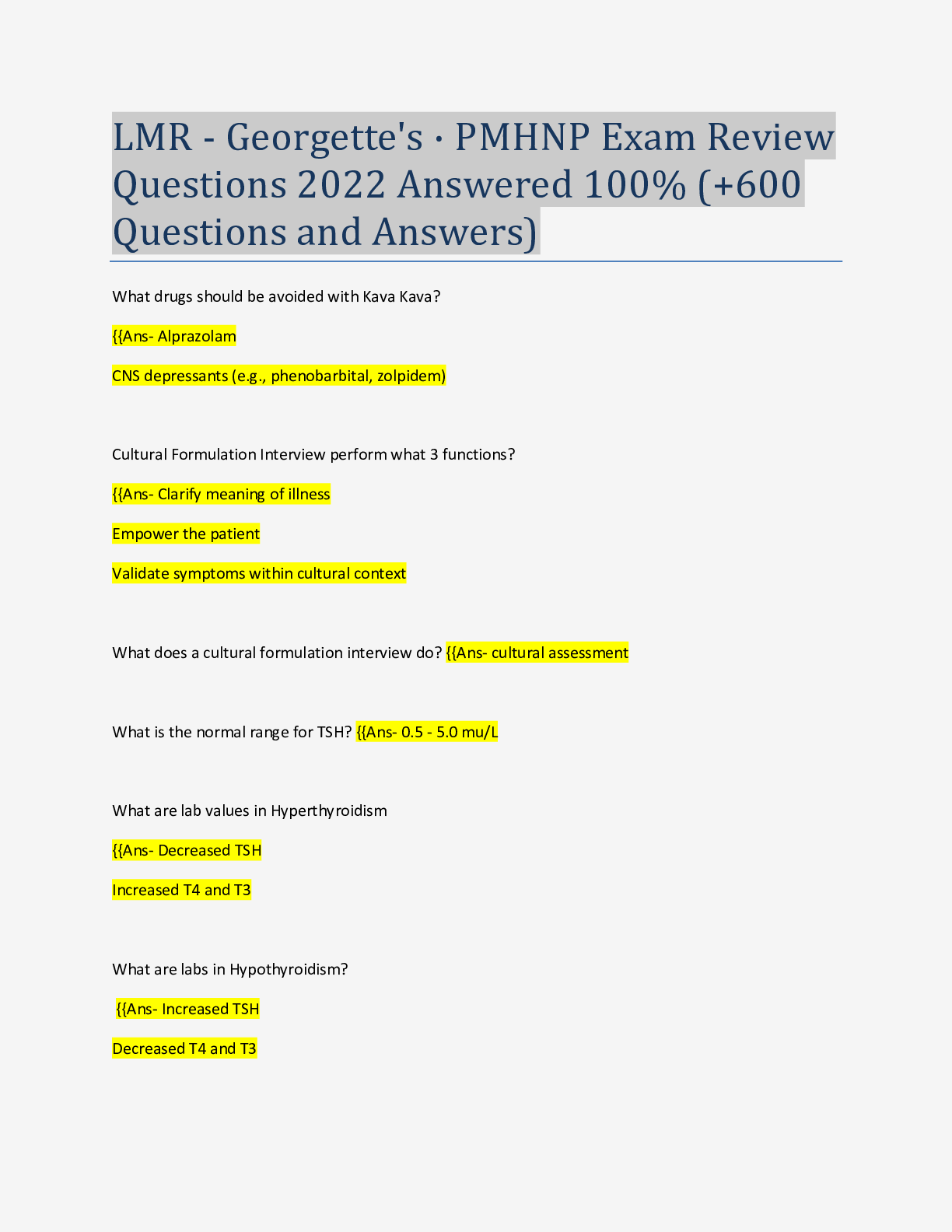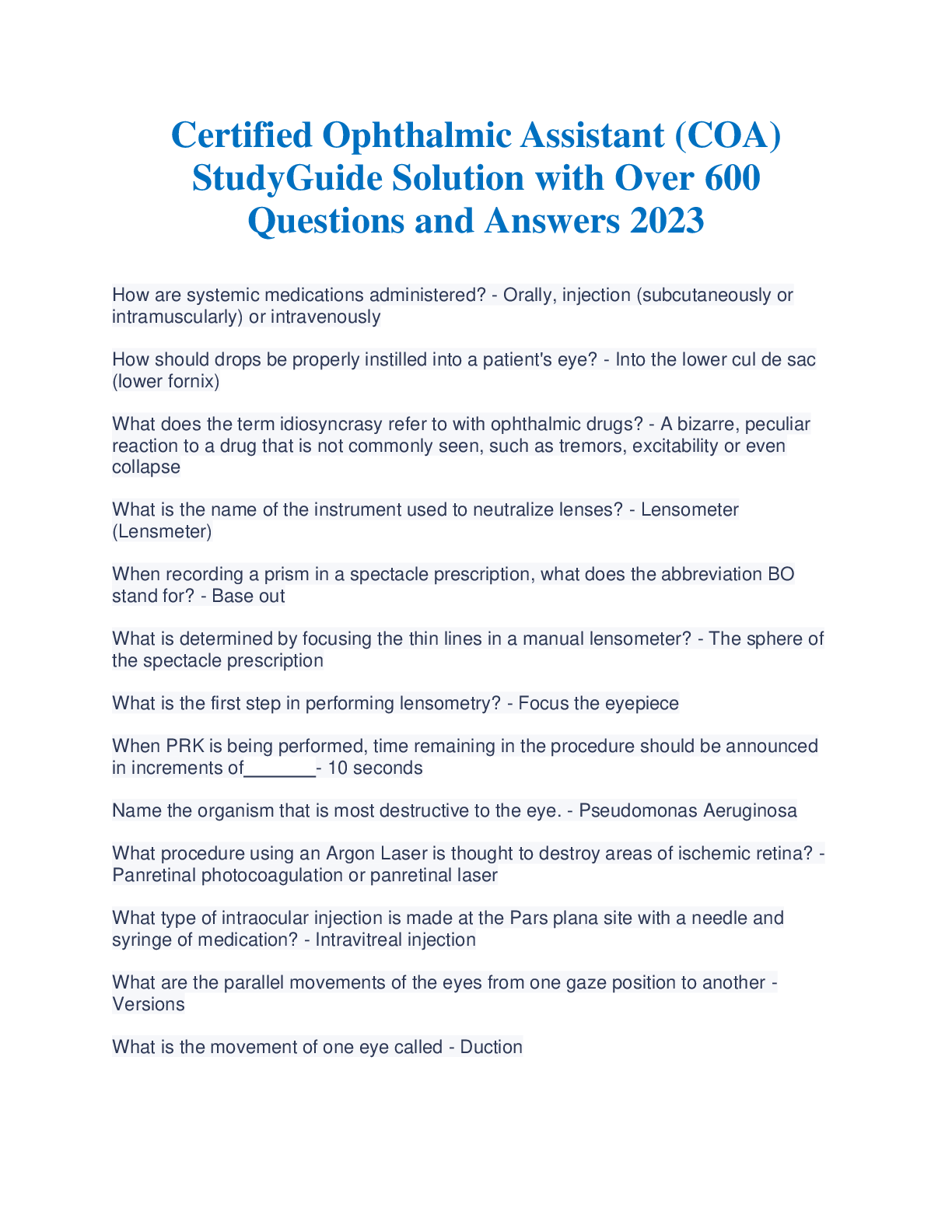Financial Accounting > EXAM > TAX 1 INCOME TAXATION. Over 600 Questions and Answers (All)
TAX 1 INCOME TAXATION. Over 600 Questions and Answers
Document Content and Description Below
INCOME TAXATION Choose the correct answer. Inherent Powers of the State C 1. The state, having the sovereignty can enforce contributions (tax) upon its citizens even without a specific provision ... in the Constitution authorizing it. Which of the following will justify the foregoing statement? Statement1: It is because the estate has the supreme power to command and enforce obedience to its will from the people within its jurisdiction. Statement2: Any provision in the Constitution regarding taxation does not create rights to the sovereignty to have the power to tax but it merely constitutes limitations upon the supremacy of tax power. a. Only statement 1 is correct b. Only the statement 2 is correct c. Bothe statement are correct d. Both statements are incorrect B 2. The following statements correctly described the power of the State to tax, except a. It is a power inherent in every sovereign state to imposed a charge or burden upon persons, properties or rights to raise revenues for the use and support of the government and to enable it to discharge its functions. b. The State can exercise the power of taxation only if it is expressly mentioned in the Constitution. c. It passes a legislative undertaking through the enactment of laws by the Congress which will be implemented by the Executive Branch of the government through its Bureau of Internal Revenue to raise revenue for the inhabitants in order to pay the necessary expenses of the government. d. It is a way of collecting and apportioning the cost of government among those who are privileged to enjoy its benefits. A 3. Which statement is wrong? a. The power of taxation may be exercised by the government, its political subdivisions, and public utilities. b. Generally, there is no limit on the amount of tax that may be imposed. c. The money contributed as tax becomes part of public funds. d. The power to tax is subject to inherent and constitutional limitations. D | 4. They exist independent of the constitution being fundamental power of the state, except a. Power of taxation1 b. Police power c. Power of eminent domain d. Power of recall B | 5. Statement 1: The constitution is the source of the State’s taxing power. Statement 2: The police power of the government may be exercised through taxation.a. Only statement 1 is correct b. Only statement 2 is correct c. Both statements are incorrect d. Both statements are incorrect C 6. Statement 1: The Constitution cannot take away the inherent powers of the State but may only prescribe its limitations. Statement 2: No laws are necessary to confer the inherent powers of the State upon any government exercising sovereignty. a. Only statement 1 is correct b. Only statement 2 is correct c. Both statements are correct d. Both statements are incorrect A | 7. The power demand proportionate contribution from persons and property to defray the necessary expenses of the government. a. Power of taxation | b. Police power | c. Power of eminent domain | d. Power of recall B | 8.The power to regulate liberty and property to promote the general welfarea. Power of taxation b. Police power c. Power of eminent domain d. Power of recall C 9. The power to acquire private property upon payment of just compensation for public purpose. a. Power of taxation b. Police power c. Power of eminent domain d. Power of recall C 10. Which of the following requires public improvement? I. Taxation II. | Police Power III. a. I only | Eminent Domain b. I and III only | c. III only | d. II and Ill only A | 11. The strongest of all inherent powers of the government is a. power of taxation | b. Police power c. Power of eminent domain | d. Power of recall A | 12. The following are the similarities among the Fundamental Powers of the State, except:a. They can be abolished by the Constitution. b. They constitute the three methods by which the State interferes with private property rights. 2 c. Each presupposes an equivalent compensation to the inhabitants. d. The emergence of the State carries with it these fundamental powers. B 13. The following statement correctly states the differences among the inherent powers of the state, except? a. The property taken under eminent domain and taxation are preserved but that of police power is destroyed. b. Eminent domain does not require constitutional grant but taxation being formidable, does in order to limit its exercise by the legislature. c. Police power and taxation is exercised only by the government but eminent domain may be exercised by private entities. d. Police power regulates both property and liberty while eminent domain and taxation affects only property rights. 14. Which of the following statements is not correct? a. Taxes may be imposed to raise revenue or to provide disincentives to certain activities within the State. D | 15. The following are the differences between the Power of Taxation and the Power of Eminent Domain, except: Power of Taxation a. Enforced proportionate contribution | Power of Eminent Domain Property to be taken is for public useb. Government has no obligation to pay Gov't is a debtor of property taken c. It operates in a community It operates on an individual d. Attribute of sovereignty Fundamental power B 16. Which of the following statements is not correct? a. The government automatically possesses the power to collect taxes from its inhabitants b. The government can enforce contribution upon its citizens only when the Constitution grants it c. Taxation power exist inseparably with the State d. The State has the supreme power to command and enforce contribution from the people within its jurisdiction D 17. Statement 1: The power to tax is supreme, plenary, comprehensive and without any limit because the existence of the government is a necessity. Statement 2: The discretion of Congress in imposing taxes extends to the mode, method and kind of tax, even if the constitution provides otherwise. a. Only statement 1 is correct b. Only statement 2 is correct 3 c. Both statements are correct d. Both statements are incorrect D 18. How broad is the power of the leg impose taxes? Answer1: The Legislature has limited discretion as to the persons, property or occupations to b where there are no constitutional restrictions, provided the property taxed, territorial jurisdiction of the state. Answer2:The legislature has the right to finally determine the amount or rate of tax, in the absence of any constitutional prohibitions and it may levy a tax of any amount as it sees fit. a. Answers 1 & 2 are false b. Answer 1 is true but answer 2 is false c. Answer 'I is false but answer 2 is true d. Answers I and 2 are true C | 19. Which of the following statements is correct? Taxes are pecuniary in nature It co-exist with the existence of the State Imposed on persons and property beyond the territorial jurisdiction of the State | I. II. III. a. I only | b. II only | c. I and II only | d. I, II and Ill A | 20. Which of the following statements is correct?I. A tax cannot be imposed without clear and express words for that purpose. II. | The provisions of a taxing act are not to be extended by implication. III. | If the law is repealed, taxes assessed before repeal of the law may no longer be collected. a. I and II only | b. II and III only | c. All of the above | d. None of the above D | 21. | Statement 1: The amount of money raised for the government in the exercise of itspower to tax is and police power is based on the needs of the government. Statement 2: The amount of money raised for the government in the exercise of its power of eminent domain is based on the cost of Processing the transfer of property from private entities and/or individuals to the government. a. Only statement I is correct b. Only statement 2 is correct c. Both statements are correct d. Both statements are incorrect D 22. Which of the following statements is true? 4 a. The power of taxation and eminent domain are both exercisable only by the government and its political subdivision. b. In police power, the property taken is preserved for public use. c. The power of eminent domain is created by the constitution. d. The exercise of the power of eminent domain and police power can be expressly delegated to the local government units by the law making body. B 23. Statement 1: People pay taxes which their government uses to expand its powers and territorial domination. Statement 2: People demand from their government certain responsibilities and then provide the government with the means to carry them out. a. Only statement 1 is correct b. Only statement 2 is correct c. Both statements are correct d. Both statements are incorrect C 24. Statement 1: Taxation and Police Power may be exercised simultaneously Statement 2: In the exercise of taxation, the State can tax anything at any time and at any amount. a. Only statement 1 is correct b. Only statement 2 is correct c. Both statements are correct d. Both statements are incorrect D 25. Statement 1: The power of taxation must first be expressly granted, either by law or by the Constitution, before the State may validly exercise it. Statement 2: The Philippine government may subject the land where embassies foreign governments are located to real property taxes. a. Only statement 1 is correct b. Only statement 2 is correct c. Both statements are correct d. Both statements are incorrect B 26. Statement 1: Since taxation presupposes an equivalent form of compensation, there should be a direct and proximate advantage received by any taxpayer before he could be required to pay tax. Statement 2: Compensation under police power is the intangible feeling of contribution to the general welfare of the people. a. Only statement I is correct b. Only statement 2 is correct c. Both statements are correct d. Both statements are incorrect C | 27. Which of the inherent powers maybe exercised even by public utility companies? a. Taxation | b. Police Power | c. Eminent domain | d. A and C5 C 28. Which of the following may not raise money for the government? a. Power of taxation b. Police power c. Power of eminent domain d. Privatization of government's capital assets C | 29. Which of the following entities, in some Circumstances, may exercise the power of eminent domain? I. II. III. IV. | Electric cooperatives Lending Cooperatives Water cooperatives Telecommunication companies a. I and III only | b. I, II and III only | c. 1, Ill and IV only | d. All of the above D | 30. | Statement1: Police power and the power of taxation are exercised primarily by thelegislature but not eminent domain. Statement 2: Taxation and eminent interferes with private right and property but not eminent not with police power. a. Only statement di is correct b. Only statement 2 is correct c. Both statements are correct d. Both statements are incorrect Theory and Basis of Taxation D | 31. The existence of the government is a necessity and that the state has the right to compel all individuals and property within its limits to contribute a. Basis of taxation | b. Situs of taxation | c. Scope of taxation | d. Theory of taxation A | 32. The reciprocal duties of support and protection between the people and the government a. Basis of taxation | b. Situs of taxation | c. Scope of taxation | d. Theory of taxation B | 33. Which statements below expresses the lifeblood theory?a. The assessed taxes must be enforced by the government b. The underlying basis of taxation is government necessity, for without taxation, a government can't either exist nor endure 6 c. Taxation is an arbitrary method of exaction by those who are in seat of power d. The power of taxation is an inherent power of the sovereign to impose burdens upon subjects and objects within its jurisdiction for the purpose of raising revenues. Purpose of Taxation D 34. The principal purpose of taxation is: a. To encourage the growth of home industries through the proper use of tax incentives. b. To implement the police Power of the State. c. To reduce excessive inequalities of wealth. d. To raise revenue for governmental needs. D | 35. After having been informed that most of the massage parlors in the city are being used as fronts for prostitution, the Sanguniang Panlungsod of Manila passed a tax ordinance subjecting within its jurisdiction to such onerous taxes" that leave them no other alternative but to stop operating. The passage of the ordinance is a valid exercise of a. Taxation | b. Police power | c. Eminent domain | d. Police power and power of taxation D | 36. | Statement 1: A provision on taxation in the Philippine Constitution is a grant of power.Statement 2: The power to tax includes the power to destroy. Statement 3: Sumptuary purpose of taxation is to raise funds for the government. A | B | C | D Statement1: | True | True | False | False Statement2: | True | True | True | True Statement3: | True | False | True | FalseC 37. Statement 1: Income tax collected from the taxpayers is the main source of revenue of the local government. Statement 2: Taxes collected are the main source of revenue of the government. A | B | C | D Statement1: | True | True | False | False Statement2: | True | False | True | FalseD 38. A tax must be imposed for a public purpose. Which of the following is not a public purpose? a. National defense b. Public education C. Improvement of sugar industry d. None of the choices 7 Aspects of Taxation B 39. The levying and imposition of tax and the collection of tax are processes which, constitute the taxation system a. Basis of taxation b. Aspects of taxation c. Nature of taxation d. Theory of taxation B | 40. The following are the aspect of taxation I — Levying or imposition of the tax on persons, property or excisesII — Collection of taxes already levied Ill- Sufficiency of governments sources to satisfy its expenditure a. I, II and III b. I and II only c. I and III only d. II and III only A 41. The official action of an officer authorized by law in ascertaining the amount of tax due under the law from a taxpayer is a. Assessment b. Delinquency c. Deficiency d. Distraint D 42. Taxation is exercised both by the legislative and executive branch of the government. Which of the following is not the function of the Congress? a. Selecting the kind of tax b. Fixing amount of tax c. Prescribing rules of taxation d. Assessment of tax liability B 43. Fixing the tax rate to be imposed is best described as a (an): a. Tax administration aspect. b. Tax legislative function. c. Aspect of taxation which could be delegated. d. Function that could be exercised by the executive branch. B 44. All of the following are legislative aspect of taxation except a. Selection of the object or subject of tax b. Valuation of property for taxation c. Fixing of tax rates d. Prescribing the general rules of taxation. A 45. All of the following are administrative functions of taxation except a. Selection of object of tax 8 b. Equalization of assessment c. Valuation of property for taxation d. Collection of taxes. D 46. Which of the following is correct? Legislative Administrative a. Fixing of tax rates Yes Yes b. Valuation of object of tax Yes Yes c. Collection of tax Yes No d. Assessment of tax liability Yes No C 47. The Commissioner of Internal Revenue is granted certain powers under the Tax Code. Which of the following is not a power granted to the Commissioner under the Code? a. Interpret tax laws and decide tax cases b. Issue summons and subpoena c. Enact tax laws and make amendments d. Make assessment and prescribe additional requirements B 48. Which of the following statement is correct? a. The BIR Commissioner has the power to interpret the provision of the Tax Code without a need of review by the DOF Secretary. b. The BIR has the authority to prescribe additional procedural/documentary requirements for taxpayers. c. The BIR shall have commissioners and a deputy commissioner. d. The BIR Commissioner can delegate the power to abate tax liabilities. LGU's Power to Tax A 49. Where does taxing power of the provinces, municipalities and cities precede from? a. Constitutional grant b. Legislative enactment c. Presidential decree or Executive act d. Local legislation A 50. How will the local government units be able folloir taxing powers? a. By local legislation b. By authority conferred by Congress c. By the issuance of the Department of Finance d. By the help of the Bureau of Internal Revenue C 51. When the power to tax is delegated to the local government a. Only the local executive can exercise the power. b. Only the legislative branch of the local government can exercise the power. c. The local executive and the legislative branch of the local government can exercise the power. 9 d. Neither the local executive not the legislative branch of the local government can exercise the power. B 52. Levying of local government taxes may be exercised by: a. The local executive only b. Local government units could exercise the power of taxation through legislated delegation. c. National legislation is exercised by Congressed d. Interpretation of Tax Laws is done by the legislative branch of government. D 53. Which of the following statements is not correct? a. Only the national government exercises the inherent power of taxation. b. Local government units could exercise the power of taxation through legislated delegation. c. National legislation is exercised by Congress. d. Interpretation of Tax Laws is done by the Legislative branch of government. Enactment of Tax Laws C 54. The legislative body enact laws to raise revenues in the absence of a constitutional provision granting said body the power to tax. Which of the following statements will justify the enactment of such law? I. The legislative body may enact tax laws even in the absence of a constitutional I provision because the power to tax is inherent in the government and not merely a constitutional grant. II. The power of taxation is an essential and inherent attribute of sovereignty belonging as a matter of right to every independent government without being expressly granted by the people. a. I only | b. II only | c. Both I and II d. Neither I nor II D | 55. The Congress enacted a new law, known as Expanded Value Added Tax Law. An association oftaxpayers questions the constitutionality of this law on the ground i that t did not originate exclusively in the House of Representatives as required by the Constitution, because it is in fact the result of the consolidation of two distinct bills, one from the House of Representatives and the other from the Senate. Is the vat law unconstitutional? a. Yes, because all appropriation, revenue or tariff bills, bills authorizing increase of public debt, bills of local application, and private bills, shall originate exclusively in the House of Representatives. b. Yes, because the Senate has no authority to propose or concur any amendments with the revenue or tax bill proposed by House of Representatives. c. No, because all appropriation, revenue or tariff bills, bills authorizing increase of public debt, bills of local application, and private bills, shall be initiated by the Senate. d. No, because it is not the law but the revenue bill which is required by the constitution to originate exclusively in the House of Representatives and insisting otherwise would violate the coequality of legislative power of the two houses of Congress and in fact would make the House superior to the Senate. 10 Use the following data for the next two questions: The Constitution requires that all revenue bills shall originate "exclusively" from the House of Representatives. Assume that in 2018, Congressman Pedro Dela Cruz proposed an expansion of the coverage of the value added tax to be known as e-vat law. The proposed bill was approved by the House of Representatives later that year. However, the EVAT version of the Senate became the EVAT law. C 56. Which of the following statements will justify the enacted EVAT law? I. The Constitution simply means that the initiative for filing revenue, tariff or tax bills must come from the House of Representatives on the theory that, elected as they are from the districts, the Members of the House can be expected to be more sensitive to the local needs and problems. II. It is not the law but the revenue bill which is required by the Constitution to "originate exclusively" in the House of Representatives because a bill originating in the House may undergo such extensive changes in the Senate that the result may be a rewriting of the whole, and a distinct bill may be produced. a. I only | b. II only | c. Both I and II | d. Neither I nor II C | 57. Assuming Senator Juan Maharlika filed in the Senate a substitute e-vat bill "in anticipation"of its receipt of the bill from the House. The proposal is totally different from the version of the lower house. Which of the following statements will justify the filing of a substitute bill by Honorable Senator Maharlika? I. To insist that a revenue statute not only the bill which initiated the legislative process culminating in the enactment of the law - must substantially be the same as the House bill would be to deny the Senate's power not only to "concur with amendments" but also to "propose amendment." II. It would be to violate the coequality of legislative power of the two houses of Congress and in fact make the House superior to the Senate. Given the power of the Senate to propose amendments, it can propose its own version even with respect to bills which are required by the Constitution to originate in the House. Filing in the Senate of a substitute bill in anticipation of its receipt of the bill from the House is not prohibited under the Constitution, so long as the action by the Senate as a body is withheld pending receipt of the House bill. a. I only | b. II only | c. I, II and III | d. None of the above. B | 58. The Congress, of taxation by centralizing the imposition and collection of all taxes in thenational society, came to the conclusion that it will be after much public hearing and good for the country to have only one system of all local government. Accordingly, passed law that would abolish the taxing power government units. Would such a law be valid under the present Constitution? 11 I. Yes, the law centralizing the imposition and collection of all taxes in the national government would not contravene the Constitution as long as a new 1aw is enacted for the common good of the people. II. No because under the present Constitution, each local government unit shall have the power to create their own sources of revenue and to levy taxes, fees, and charges subject to such guidelines and limitations as Congress may provide consistent with the basic policy of local autonomy. III. No. It is clear that Congress can only give the guidelines and limitations on the exercise by the local governments of the power to tax but what was granted by the fundamental law cannot be withdrawn by Congress. a. I only | b. Il and III only | c. I, II and Ill | d. None of the above D | 59. The city council passed a tax ordinance imposing an occupation tax or profession oroccupation of an "industrial engineer". GJ is the only person with such an occupation in the city. Which of the following is correct? a. GJ can successfully challenge the validity of the ordinance being discriminatory since he is the only one adversely affected. b. The ordinance violates the constitutional rule of equality in taxation. c. The ordinance is a "class legislation" since it does not subject to occupation tax the other industrial engineers. d. The ordinance is a valid exercise of the council's power to enact tax ordinance to raise revenue under the Local Government Code. D 60. Which of the following is incorrect? a. Taxes may be imposed retroactively by law but, unless so expressed by such law, these taxes must only be imposed prospectively. b. Tax laws are neither political nor penal in nature. c. The "ex post facto" rule is not applicable in taxation. d. None of the above B 61. On January 1, 2017, the Congress enacted a law increasing the corporate income tax from 30% to 40%. The law provides retroactive effect starting January 1, 2010. The Philippine Chamber of Commerce questions the validity of the law. Is the law constitutional? a. No, because the retroactive effect of the law constitutes deprivation of right to property of corporation without due process of law. b. No, because the 40% interest rate is violation of due process of law for being excessive and unreasonable. c. Yes, because the power of taxation is an inherent power of a sovereign State and it is based on the lifeblood doctrine and necessity theory. 12 d. Yes because the power of taxation is an essentially legislative power within the exclusive prerogative of the Congress that its wisdom is beyond the reach of the Supreme Court. B 62. The 30% corporate income tax is increased to 35% by the Congress for the purpose of raising revenue to be used for national road expansion project near Bonifacio Global City, a private corporation. Is the exercised of the taxing power unconstitutional? a. Yes, because taxing power must be exercised exclusively for public purpose without any incidental benefit to any private entity. b. No, because the it is exercised directly for public purpose and the benefit to a private entity is only incidental. c. Yes, because the increase in tax rate constitutes deprivation of right to property of corporation without due process of law for being excessive and unreasonable. d. No, because the constitution does not expressly state that the power of taxation must be used only for public purpose, thus, it may be used to benefit a private entity. Characteristics/Elements of Tax B 63. One of the following is not a characteristic or an element of tax. a. It is levied by the legislature b. It is payable in money or in kind c. It is proportionate in character d. It is an enforced contribution D 64. Being legislative in nature, the power to tax may not be delegated except: a. To local governments or political subdivisions b. When allowed by the Constitution c. When delegation relates merely to administrative implementation that may call for some degree of discretionary powers under a set of sufficient standards expressed by law or implied from the policy and purpose of the act. d. All of the choices D | 65. All of the following, except one, are basic principles of a sound taxation system: Sound Tax Systema. Fiscal adequacy b. Administrative feasibility c. Theoretical justice d. Inherent in sovereignty C deficit: | 66. Under this basic principle of a sound taxation systems the government should not incur aa. Theoretical justice b. Administrative feasibility c. Fiscal adequacy d. None of the above C 67. The basic principle of a sound taxation system, where, "Taxes must be based on the taxpayer's ability to pay" is called: 13 a. Equality in taxation b. Ability to pay theory c. Theoretical justice d. Equity in taxation C | 68. The tax law must be capable of convenient, just and effective administration a. Theoretical justice b. Fiscal adequacy c. Administrative feasibility d. Rule of apportionment Double Taxation A | 69. The following constitute double taxation, except onea. Both taxes are imposed in the same amount. b. Both taxes are levied for the same purpose c. Both taxes are imposed by the same taxing authority d. Both taxes are imposed upon the same person D 70. Which is not a double taxation? a. A lessor of property pays a real estate tax and income tax on the same property. b. Imposition of tax on the finished products and the raw materials used in the production of the said finished products. c. Imposition of tax on corporate income and shareholder's dividends from the same corporation. d. All of the above. D 71. One of the following is a false statement about double taxation. Which is it? a. There is no constitutional prohibition on double taxation. b. Direct duplicate taxation is a valid defense against a tax measure if it is violative of the equal protection clause. c. Absence of any of the elements of direct double taxation makes it indirect duplicate taxation. d. A 20% final withholding tax on interest income on bank deposits and a 5% gross receipts tax on banks is a direct duplicate taxation. C 72. Which of the following statements is correct? a. Indirect double taxation violates the Constitutional provision of uniformity and equal protection. b. There is direct double taxation in taxing the income of the corporation and again subject the portion of that income declared as dividend to final tax. C. Indirect double taxation is legal as long as there is no violation of equal protection and uniformity clauses of the Constitution. d. All of the above D 73. The usual mode(s) of avoiding occurrence of double taxation is/are: a. Reciprocal exemption, either by law or treaty b. Tax credit of foreign taxes paid c. Deduction for foreign taxes paid d. All of the above Inherent and Constitutional Limitations 14 C 74. Statement 1: Inherent limitations are the natural restrictions to safeguard and ensure that the power of taxation shall be exercised by the government only for the betterment of the people whose interest should be served, enhanced and protected. Statement 2: Constitutional limitations are provisions of the fundamental law of the land that restrict the supreme, plenary, unlimited and comprehensive exercised by the State of its inherent power to tax. a. Only statement 1 is correct b. Only statement 2 is correct c. Both statements are correct d. Both statements are incorrect C 75. Which of the following is incorrect description of taxation? a. Legislative and inherent for the existence of the government. b. Necessary and for public purpose c. Supreme and absolute power of the State d. The strongest of all inherent powers of the State. D 76. Which limitation on the power of taxation inherently implied that the State's primary concern is for the common good of the people? a. Equality in taxation b. Equal protection of law c. Due process of law d. For public purposes B 77. These are restrictions imposed by the Constitution. a. Inherent limitations b. Constitutional limitations c. Basic principles of sound tax system d. None of the choices B 78. Which of the following is a constitutional limitation on the power of taxation? I. Territoriality of taxes II. Public purpose III. Legislative in character IV. Non-appropriation for religious purpose a. I only b. VI only c. II and IV d. III and VI only D | 79. "Equality in taxation" means: Progressive system of taxation shall be applied. The tax laws and their application must be fair, just, reasonable and proportionate to one's ability to pay. IN. The tax laws shall give emphasis on direct rather than indirect taxes or on the ability-to-pay principle of taxation. I. II. III. 15 a. I only b. lI only c. Ill only d. I, II and III C 80. Statement 1: Uniformity in the imposition and/or collection of taxes means that all taxable articles or kinds of property of the same class shall be taxed at the same rate. This requirement is complied with when the tax operates with the same force and effect in every place where the subject of it is found. Statement 1: Uniformity rule is not violated when different articles are taxed at different amounts provided that the rate is uniform on the same class everywhere with all people at all times. a. Only statement 1 is correct b. Only statement 2 is correct c. Both statements are correct A 81. Statement 1: A tax is deemed to have satisfied the uniformity rule when it operates with the same force and effect in every place where the subject may be found. Statement 2: The equal protection clause of the Constitution forbid classification based on real and substantial differences having a reasonable relation to the subject of the particular legislation. a. Only statement 1 is correct b. Only statement 2 is correct c. Both statements are correct d. Both statements are incorrect D | 82. Which of the following statements correctly described "Equal protection" clause of the Constitution regarding the government's power to tax? I. | All persons subject to legislation shall be treated alike under similar circumstances and conditions, both in the privileges conferred and imposed. The purpose is to protect persons belonging to the same class against intentional and arbitrary discrimination. There is denial of equal protection of laws if there is discrimination in the implementation of tax laws. II. III. a. I and II only b. I and IN only c. II and Ill only 16 d. I, II and Ill C | 83. A fundamental rule in taxation is that "the property of one coup another country may not be taxed by another country". This is known as? a. International law b. Reciprocity c. International comity d. International inhibition 84. May the Philippine government require tax withholding on the salaries of Filipino employees | B working in the American Embassy in the Philippines? a. No, because this will violate the rule on international comity. b. No, because if the Philippine government would impose the requirement of tax withholding on the salaries. of Filipino employees working in the Philippine Embassy in the Philippines, this would in effect require that the American government be constituted as the withholding agent of the Philippine government insofar as the taxes on the salaries of the Filipino employees are concerned. c. Both 'a" and "b" d. None of the above C 85. One of the following is not a Constitutional limitation on the power of taxation? a. Exemption from taxes of revenues and assets of educational institutions, including grants, endowments, donations and contributions. b. Non-impairment of the jurisdiction of Supreme Court in tax cases. c. Exemption of the government from taxes. d. Non-infringement of religious freedom and worship. C 86. This stems from the principle that we pay taxes for the protection and services provided by the taxing authority which could not be provided outside the territorial boundaries of the taxing state. a. The tax imposed should be for public Purpose. b. There should be no improper delegation of the taxing power. c. The power to tax is limited to the territorial jurisdiction of the taxing government. d. Exemption of government entities from taxation. A 87. Compliance with procedural requirements must be followed strictly to avoid collision between the State's power to tax and the individual's recognized rights. a. Due process of law b. Equality in taxation c. Non-infringement of religious freedom d. Non-impairment of obligations and contracts C 88. No person shall be imprisoned for non-payment of this. a. Property tax 17 b. Excise tax c. Poll tax d. Income tax B 89. This requires that all subjects or objects of taxation, similarly situated are to be treated alike or put on equal footing both in privileges and liabilities. a. Due process b. Uniformity c. Progressive taxation d. None of the choices A 90. The following are the constitutional limitations on the power of taxation, except ? a. Only Congress can exercise the power of taxation. b. Non-impairment of the obligation of contracts. c. Taxes are not subject to set-off or compensation. d. The rule of taxation shall be uniform. Exemption from Taxation B 91. No law granting any tax exemption shall be passed without the concurrence of – a. Majority of all members of Congress b. 2/3 vote of all members of Congress c. % vote of all members of Congress d. Unanimous vote of all members of Congress D 92. Mapagbigay School, a non-stock non-profit Pertaining resident citizen, his residential house and lot. Pedro would be using the proceeds of the sale to buy his new residential house and lot. On the other hand, the school will use the parcel of land to construct a new building for its dormitory for its medical students. Which of the following statements regarding liability for the payment of capital gains tax is correct? I. | Pedro is liable to capital gains tax. However, if what was sold was his principal with the parcel of the residence, he may apply for tax exemption, provided that he complies requirements laid down in the Tax Code. Pedro is not liable to capital gains tax because the sale was made in favor of a non-stock, non II. profit educational institution and that the property will be used for educationally-related functions. III. | Pedro is liable to capital gains tax because the tax is imposed on the seller; thus, notwithstanding any exemption enjoyed by the buyer, the tax shall still be imposed.a. I only b. II only 18 c. I and II only d. I and Ill only A 93. As an incentive for investors, a law was passed giving newly established companies in certain economic zone exemption from all taxes, duties, fees, imposts and other charges for a period of three years. ABC Corporation was organized and was granted such incentive. In the course of business, ABC purchased mechanical equipment from XYZ Incorporated. The latter, in its ordinary business dealings, is subject to vat. XYZ Inc. claims, however, that since it sold the equipment to ABC Corp. which is tax exempt, it should not be liable to pay the vat. Is this claim tenable? a. No. Exemption from taxes is personal in nature and covers only taxes for which the taxpayergrantee is directly liable. Vat is a tax on the seller who is not exempt from taxes. Since XYZ Inc. is directly liable for the vat and no tax exemption privilege is ever given to him, its claim that the sale is tax exempt is not tenable. b. Yes, exemption from tax should not be discriminatory in nature. A seller of goods or service to tax exempt individuals or entities shall be accorded the same exemption provided by law to a buyer. c. Yes, applying uniformity rule. d. None of the above C 94. Juan Dela Cruz Memorial Hospital is a 100-bed domestic hospital organized for charitable purposes. However, out of 100-bed capacity, 40-beds are allotted for paying patients. while the rest are intended for charity patients. The revenues generated from these paying patients, however, are being used to improve the facilities of the hospital. Can said hospital claim exemption from income tax as well as real property tax ? Answer 2: The hospital is subject to 10% tax on its net income, subject to compliance the institution, with the "predominance test", a. Only the first answer is correct b. Only the second answer is correct c, Both answers are ,correct d. Both answers are incorrect C 95. Saint Mary's University (SMU) is a non-stock, non-profit educational institution registered with Securities and Exchange Commission (SEC) as a corporation. For the year ended December 31, 2018, it reported rental income amounting to P150M from various tenants leasing portions of the said corporation. The Bureau of Internal Revenue (BIR) assessed SMU 1245M deficiency income tax for rental income earned. Is the action of the BIR proper? a. No, because a proprietary educational institution shall be subject only to 10% preferential corporate income tax. 19 b. No, because all revenues of non-stock, non-profit educational institution shall be exempt from taxes and duties as long as they are used actually, directly and exclusively for educational purposes. c. Yes, because leasing of property is not actually, directly and exclusively related to educational purposes. d. Yes, because taxes are the lifeblood of the government and tax exemptions are construed strictly against the taxpayer and liberally in favor of the government. C 96. Mike is the owner of a P500,000 sq. m. parcel of land located in New Manila, Quezon City. He leased the property for P500,000 a year to a religious congregation for a period of ten (10) years. The religious congretion built on a 1,000 sq. m. portion a seminary and chapel which is used in connection with its religious activities. It also constructed a ten (10) story building its the remaining 4,000 sq. m. which it rented out to various commercial establishments, the proceeds of which go to the support of its various seminaries located throughout the Philippines. These seminaries are organized as non-profit and non-stock educational institutions. Which of the following is the correct tax implication of the foregoing data with respect to payment of income tax? a. The religious congregation is exempt from payment of income taxes on rental receipts because the collections were used to support its various seminaries located throughout the Philippines. b. The religious congregation is exempt from payment of income taxes on rental receipts provided not more than 30% of its receipts were used for administrative purposes. c. The religious congregation is subject to income taxation. The constitutional tax exemptions refer only to real property that are actually, directly and exclusively used for religious, charitable or educational purposes, and that the only constitutionally recognized exemption from taxation of revenues are those earned by non-profit, non-stock educational institutions which are actually, directly and exclusively used for educational purposes. d. None of the above A 97. The basis or test of exemption of real properties owned by religious, or charitable entities from real property taxes is: a. Use of the real property b. Ownership of the real property c. Location of the real property d. Ownership or location real property at the option of the government D 98. "Government agencies performing governmental functions are exempt from tax unless expressly taxed while those performing proprietary functions are subject to tax unless expressly exempted" refers to: 20 a. The tax imposed should be for public purpose. b. There should be no improper delegation of the taxing power. c. The power to tax is limited to the territorial jurisdiction of the taxing government. d. Exemption of government entities from taxation. D 99. A taxpayer gives the following reasons for refusing to pay a tax. Which of his reasons is not acceptable for legally refusing to pay the tax? a. That he has been deprived of due process of law. b. That there is lack of territorial jurisdiction. c. That the prescriptive period for the tax has lapsed. d. That he will derive no benefit from the tax. B 100. It literally means "place of taxation" the country that has the power and jurisdiction to levy Situs Taxation and collect the tax a. Basis of taxation b. Situs of taxation c. Scope of taxation d. Theory of taxation B 101 . Which among the following concepts of taxation is the basis for the situs of income taxation? a. Lifeblood doctrine of taxation b. Symbiotic relation in taxation c. Compensatory purpose of taxation d. Sumptuary purpose of taxation C 102. The least source of tax laws: a. Statutes b. Presidential decrees c. Revenue regulations d. Tax treaties or conventions C 103. Statement 1: A revenue regulation must not be contrary to the provision of the law that it implement Statement 2: A revenue regulation cannot expand the provision of the taw that it implements by imposing a penalty when the law that authorizes the revenue regulation does not impose a penalty. 104 [Show More]
Last updated: 1 year ago
Preview 1 out of 124 pages

Buy this document to get the full access instantly
Instant Download Access after purchase
Add to cartInstant download
We Accept:

Reviews( 0 )
$14.00
Document information
Connected school, study & course
About the document
Uploaded On
Jul 01, 2022
Number of pages
124
Written in
Additional information
This document has been written for:
Uploaded
Jul 01, 2022
Downloads
0
Views
44

